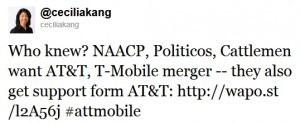[flv width=”512″ height=”298″]http://www.phillipdampier.com/video/WSJ Studios disarming cable in battle with Netflix Media Report 6-20-11.flv[/flv]
Wall Street Journal: Top execs of some media behemoths are shifting their public stances toward Netflix Inc. of late. They’re now trying to persuade investors that the video streaming service will expand their business rather than destroy it. (4 minutes)
You are forgiven if you are confused about the love-hate relationship the cable industry has with online video streamers like Netflix — one that the Wall Street Journal likens to manic bipolar episodes. Weeks after blaming Netflix for getting video programming too cheaply and threatening cable subscriptions, cable industry executives were hugs and kisses about online video at the recent Cable Show in Chicago.
“The reason why there’s interest in these Internet video providers that is that they’re deploying technology that’s making the experience better for consumers,” Time Warner Cable CEO Glenn Britt said in an interview with MarketWatch during the National Cable & Telecommunications Association’s annual Cable Show last week.
“There’s nothing about [cable companies] that stops us from doing that. So I would say … we as an industry just need to pay attention and give consumers what they want. Then there’s no room for these other guys. I don’t mean to say that in a negative way, but it’s true.”
Of course, this is the same man that has earplugs firmly implanted to help resist another rejection of his Internet pricing schemes that Time Warner Cable customers loathed in 2009. Britt’s desire to give “consumers what they want” just doesn’t play in this part of town while the cable company is installing software to measure and potentially meter broadband usage.
What is different in the online video spectrum is consumers have choices. They can adopt Time Warner Cable’s glacially-slow rollout of its TV Everywhere concept, watch Hulu, use Netflix, or simply steal content providers don’t want them to watch. For customers of Time Warner Cable facing competition from AT&T, there is potentially nowhere to run to avoid an Internet Overcharging scheme which could bring the online viewing party to a rapid conclusion when your viewing allowance is used up.
Britt says he is struggling with rights holders to provide more accessibility to online video streaming of popular shows. He’s also thinking about how many restrictions to slap on subscribers.
MarketWatch talked with Britt and found him dealing with nagging questions about how many devices each user account should be authorized to use for viewing. “Should it be three, should it be 10? If I make [that number] too small, you’re not going to be happy as a customer,” Britt philosophized. “If I make it too big, you’re going to give the password to all of your friends, and they won’t have to buy a subscription to begin with.”


 Subscribe
Subscribe









